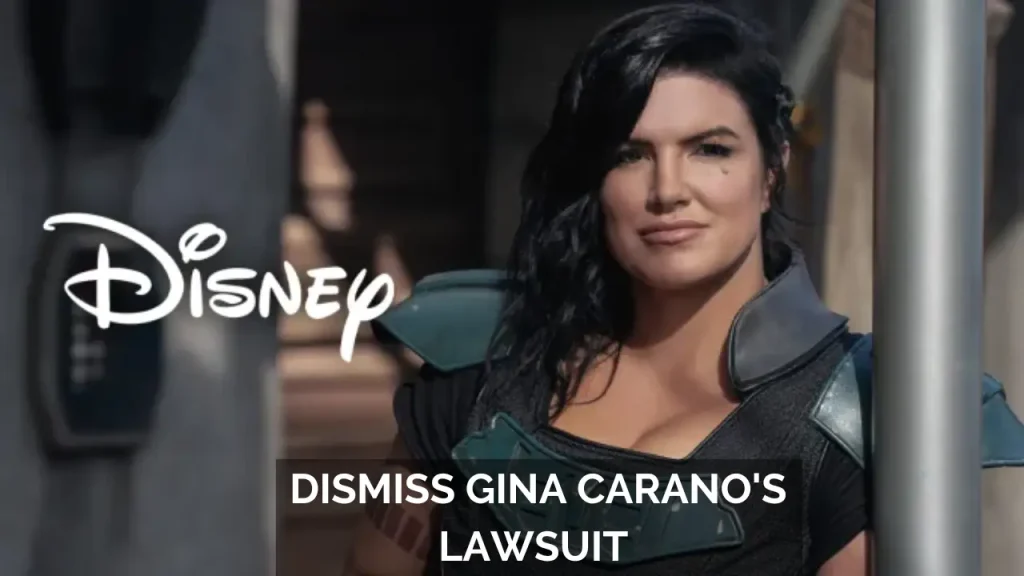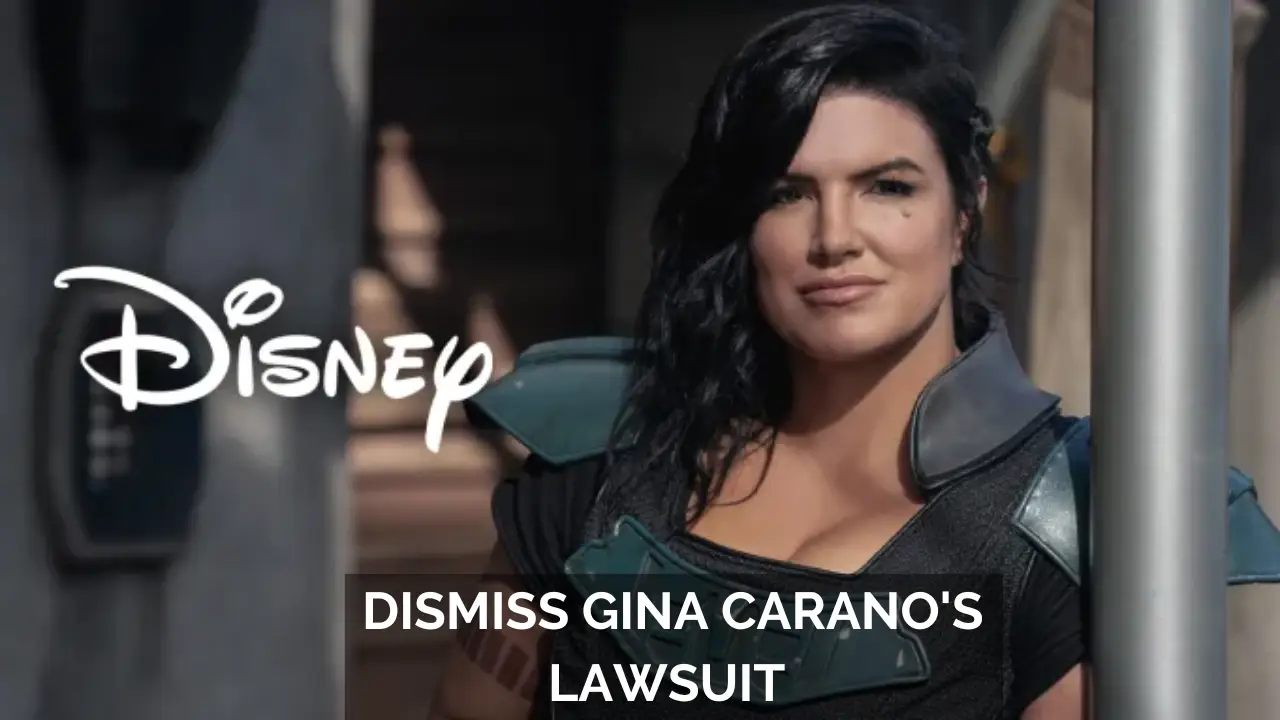
Gina Carano, a former MMA fighter and actress, gained fame for her role as Cara Dune in Disney+’s The Mandalorian.
Her career took a dramatic turn in 2021 when she was fired from the series amid controversy over her social media posts.
Carano’s posts, including a comparison of American political divisions to Nazi Germany, led to significant backlash and her subsequent dismissal by Disney and Lucasfilm.
Carano responded by filing a lawsuit against Disney, Lucasfilm, and Huckleberry Industries, alleging wrongful discharge and sex discrimination.
Disney has recently filed a motion to dismiss the lawsuit, claiming First Amendment protections and defending their decision as a matter of brand integrity. This article explores the details of the case, Disney’s legal arguments, and the broader implications.
Background: Gina Carano’s Firing
Gina Carano’s dismissal was precipitated by a series of controversial social media posts.
- Controversial Posts: In February 2021, Carano shared a post on TikTok that compared the political climate in the U.S. to Nazi Germany. This comparison was widely criticized for trivializing the Holocaust.
- Disney’s Response: Disney and Lucasfilm quickly announced Carano’s termination. Their public statement emphasized that her posts were inconsistent with the company’s values and stated that her comparison of U.S. political divisions to Nazi Germany was unacceptable
- Public Backlash: Carano’s firing received mixed reactions. Supporters argued it was an example of cancel culture, while critics believed Disney acted correctly in distancing itself from controversial statements. This controversy fueled debates about free speech and corporate responsibility.
Details of the Lawsuit
In the wake of her dismissal, Gina Carano decided to fight back by filing a lawsuit against Disney, Lucasfilm, and Huckleberry Industries. The lawsuit, filed in a federal court in Los Angeles, accuses the companies of wrongful discharge and sex discrimination. Carano argues that her termination was not based on her performance or professional conduct, but rather on her personal political beliefs.
One of the key points in Carano’s legal argument is that she was treated differently from her male co-stars who made similarly controversial political statements.
For example, she pointed out that Pedro Pascal, her co-star in The Mandalorian, had made several posts comparing Donald Trump’s administration to Nazi Germany without facing any repercussions.
Carano’s legal team argues that this disparate treatment constitutes sex discrimination.
Additionally, the lawsuit claims that Disney and Lucasfilm violated Carano’s First Amendment rights by firing her for expressing her personal political beliefs.
Carano’s legal team contends that employers do not have the right to control or punish employees’ personal speech, especially when that speech does not directly impact their work or the company’s operations.
Disney’s Motion to Dismiss
On April 10, 2024, Disney filed a motion to dismiss Carano’s lawsuit, presenting several key arguments.
- Constitutional Right to Disassociate: Disney claims it has the constitutional right to dissociate its brand from Carano’s speech. They argue:
- Brand Protection: Carano’s posts conflicted with Disney’s values and public image, warranting her dismissal to protect the company’s reputation.
- First Amendment Defense: Disney argues that their decision was based on the content of Carano’s posts rather than discriminatory motives.
- Context of Termination: The company maintains that Carano’s dismissal was a response to her specific actions, not a general stance against her political views.
Gina Carano’s Response to the Motion
Gina Carano and her legal team responded to Disney’s motion to dismiss on May 9, 2024. In their filing, they argue that Disney is misinterpreting the First Amendment and using it as a shield to justify wrongful termination.
Carano’s legal team contends that the First Amendment does not give Disney the absolute authority to fire her for expressing her personal beliefs, especially when those beliefs were shared on her personal social media accounts and were unrelated to her work.
Carano’s legal team also disputes Disney’s characterization of her social media posts. They argue that Carano did not disparage anyone or trivialize the Holocaust, and that her posts were taken out of context.
They emphasize that Carano’s comments were not directed at Disney, Lucasfilm, or The Mandalorian, and therefore should not have been grounds for termination. Additionally, Carano’s team highlights the difference in treatment between her and her male co-stars, reinforcing her claim of sex discrimination.
The Role of Elon Musk in the Case
Elon Musk has publicly supported Gina Carano, adding complexity and publicity to the case.
- Financial Backing: Musk announced that he would cover Carano’s legal expenses, positioning himself as a defender of free speech.
- Conflict with Disney: Musk’s support is also linked to his ongoing disputes with Disney over content moderation and advertising on X (formerly Twitter).
- Increased Visibility: Musk’s involvement has amplified the case’s media coverage and public interest, further polarizing opinions on the lawsuit.
Public and Industry Reactions
The lawsuit has elicited a wide range of reactions from the public and industry professionals.
- Public Reaction:
- Supporters: Many view Carano’s lawsuit as a fight against cancel culture and political discrimination.
- Critics: Others believe Disney acted appropriately in distancing itself from controversial statements.
- Industry Impact:
- Debate on Free Speech: The case has reignited discussions about free speech and corporate responsibility in Hollywood.
- Carano’s Career: Despite her firing, Carano has continued working with conservative media outlets, such as films produced by The Daily Wire.
Legal and Industry Implications
The legal battle between Gina Carano and Disney has the potential to impact Hollywood in several significant ways.
If Carano’s lawsuit proceeds and she is successful, it could set a precedent for how studios can and cannot respond to the personal speech of their employees.
This could lead to changes in how contracts are structured and how studios navigate the complex relationship between creative talent and corporate values.
From an employment law perspective, the case could also influence how wrongful discharge and discrimination claims are handled, particularly in industries where public image and brand reputation are paramount.
The balance between personal speech and company values is a delicate one, and this case may help clarify where the lines should be drawn.
For Disney, the lawsuit poses a potential risk to its reputation and could lead to increased scrutiny of its employment practices.
The company’s decision to fire Carano was based on protecting its brand, but the lawsuit could force Disney to defend its actions in a court of law, potentially revealing internal decision-making processes and corporate policies.
Current Status and Next Steps
The lawsuit’s current status and upcoming proceedings include:
- Hearing Date: A critical hearing on Disney’s motion to dismiss is scheduled for June 12, 2024.
- Possible Outcomes:
- Trial: If the motion is denied, the case may proceed to trial, involving detailed arguments and evidence.
- Settlement: There is also a possibility of a settlement, although no discussions have been publicly confirmed.
Carano’s Career: Carano remains active in the entertainment industry, primarily through projects with conservative media.
Conclusion
The legal battle between Gina Carano and Disney encapsulates broader debates about free speech, corporate values, and the influence of social media in professional settings.
As both sides present their arguments, the case highlights the tension between protecting brand image and respecting individual expression.
The final decision will likely shape how similar disputes are handled in the future and may influence industry standards regarding employee conduct and social media usage.
Reflecting on the case, it underscores the evolving nature of employment law and corporate governance in the digital age.
As the legal process continues, the resolution of this case will provide valuable insights into the balance between personal freedoms and corporate interests, offering a potential roadmap for navigating these issues in an increasingly polarized society.
FAQs About Disney’s Motion to Dismiss Gina Carano’s Lawsuit
Why did Disney file a motion to dismiss Gina Carano’s lawsuit?
Disney filed a motion to dismiss Gina Carano’s lawsuit arguing that the First Amendment allows them to distance themselves from Carano’s controversial social media posts, which they claim conflict with their brand values.
What are Disney’s main arguments in their motion to dismiss?
In Disney’s motion to dismiss Gina Carano’s lawsuit, the company argues that their decision to terminate her was based on her posts, including a comparison of current political divisions to Nazi Germany, and not on discriminatory grounds.
How has Gina Carano responded to Disney’s motion to dismiss?
Gina Carano has countered Disney’s motion to dismiss by arguing that the First Amendment does not justify her termination for her personal beliefs. She claims that her comments were misrepresented and did not warrant her dismissal.
What role has Elon Musk played in the case related to Disney’s motion to dismiss Gina Carano’s lawsuit?
Elon Musk has supported Gina Carano in her legal battle against Disney, financially backing her lawsuit and publicly criticizing Disney’s handling of her termination, which adds visibility to the case.
What was the reason for Carano’s firing that led to Disney’s motion to dismiss?
Carano was fired due to social media posts that Disney deemed inconsistent with their values, including a post comparing political divides to Nazi Germany. Disney’s motion to dismiss argues this was a valid reason for termination.
What could be the impact of Disney’s motion to dismiss on the entertainment industry?
The outcome of Disney’s motion to dismiss Gina Carano’s lawsuit could influence how companies manage employee speech and social media conduct, potentially affecting employment practices and debates around free speech in the industry.
When is the hearing for Disney’s motion to dismiss Gina Carano’s lawsuit scheduled?
The hearing for Disney’s motion to dismiss Gina Carano’s lawsuit is scheduled for June 12, 2024, where arguments from both sides will be presented to the court.


